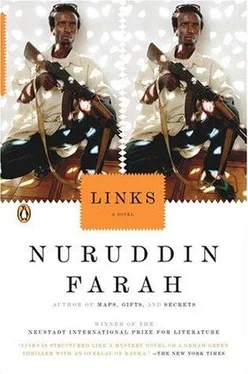“Have you lived here for long?”
“We’ve been very unhappy,” she said.
Jeebleh looked about, distressed.
“Perhaps the deteriorated state of the garden and the house explains why we’ve been unhappy here,” she said.
How unlike one another are unhappy families: Tolstoy?
“We’ve stayed on a collision course, Faahiye and I,” she said, “quarreling a great deal and unnecessarily. We’ve been in the sight of an evil eye, that’s seen much ill!”
“Because of what?”
“Because of the curse of which I’ve spoken.”
“But Bile at least had no choice,” Jeebleh reasoned.
Yet there was no reasoning with her. She said, her voice shaken, “He touched me in ways that he shouldn’t have. And because of this, we’ve earned ourselves a curse, this way harvesting nature’s ill intentions.”
“In his place, what would you have done?”
“In my rational mind, I know that it was a matter of life and death, and he had to make a decision, and voted in favor of life, voted for life. I am alive, and Raasta is a wonder child and, thank God, healthy. You ask what the problem is? Well, the problem is that what’s been done can’t be undone. The problem is that the curse has become part of us, affecting us all.”
Her expression reminded him of the oval face of an owl in the dark, seen from the advantaged position of someone in the light. “Was that part of the curse, what happened between Bile and Faahiye the moment they met?”
“They were at each other’s throats, because of what happened,” she said, “and it fell to me to make peace between them. It’s always fallen to women to forge the peace between all these hot-blooded men, always ready to go to war at the slightest provocation. Faahiye and my brothers are no different from the majority of men who’ve brought Somalia to ruin! Why do men behave the way they do, warring?”
“What do you think?” he asked.
“Maybe because they’ve got no sense of grief?”
He let this pass without comment, and waited for her tears to subside.
“Tell me who the boy in the house is.”
There was smugness in her gaze as she turned in the direction where the boy was playing by himself. “He belongs in The Refuge. He came here to play with Raasta the day she disappeared, and has since refused to go anywhere else until she’s back. He has become a kind of insurance policy, mine, that there will be a child in this house!”
It struck Jeebleh that for his entire visit, she didn’t seem mad at all. Emotionally charged, yes, but that was more than understandable in a woman whose daughter was missing. In fact, she was confident enough to pleasantly offer him a plate of warmed-up food — yesterday’s leftovers — if he had a mind to eat. And she was talking in a straightforward manner and answering his questions, and saying and doing nothing far-fetched or deranged. No one would doubt that she was as sane as he was.
He shifted the conversation: “Whose idea was it, do you know, that dinners at The Refuge should be a communal affair?”
She wasn’t sure specifically, but thought it could only have been a woman’s idea, even if it had come from Bile, who might have relied on the women around him. Women, after all, often ate in this way and knew the benefits accruing from it.
He nodded, remaining silent.
“For one thing, women waste less food,” she said. “For another, eating together from the same plate is more gregarious. Besides, as you well know, we women have always eaten together, after serving our husbands. That women are content with seconds or leftovers suggests that we’re prepared to compromise for the sake of peace. Not so men!”
He let the silence run its full course, and then asked if she had any suggestions about how he could reach the woman who had kept house for his mother. Her stare as hard as stone, she looked ahead of her, as though not aware of him at all. Again her lips moved like a bird feeding. Then her lips stopped and formed an O. “I knew where she lived, in Medina, before the collapse. I haven’t seen her since then, as I had no reason to. But it shouldn’t be difficult to find her if she’s alive and in the city.”
“Caloosha tells me she’s left for Mombasa.”
“Isn’t that what he says about Faahiye too?”
“That’s right.”
“Have you asked Dajaal to look for her?”
He responded that he hadn’t, and she reiterated that Dajaal could find anyone or anything; he was useful that way.
“Bile tells me that, among other things, you’ve come here to honor the memory of your mother,” she said. “I would like to join you in doing so for our mother too. They raised us together as one family. What did you have in mind?”
His prayers for his mother began right away, in his imagining, with the whistle of a red-and-yellow-breasted robin perched on the branch of the mango tree.
He said, “I would like somehow to mark my mother’s passing, perhaps with a day of prayers, a gathering of some sort, most likely at The Refuge. But first I’d like to locate her grave and pay a visit, and then maybe commission the raising of a stone in prayer, in her memory. Nothing extravagant, like a mausoleum, but it would be good if I could in some way reclaim her troubled soul from the purgatory to which Caloosha helped relegate her.”
“The idea of using The Refuge to commemorate her life is wonderful,” she said. “I like it very much, and hope that Raasta is there to celebrate the marking with us.”
She released a long-suppressed snuffle.
He fell silent, ready to ask her pardon and take his leave, as soon as it was decent to do so.
WHEN HE RETURNED TO BILE’S, JEEBLEH INSERTED THE KEY IN THE LOCK but had difficulty opening it. The key would turn loosely, without engaging to move the bolt. Then he heard footsteps approaching cautiously, and guessing it might be Seamus, he announced himself: “It’s me, Jeebleh!”
The bolt was released at once, the door opened, and Seamus stood there, broad as his smile.
“Is she off her rocker, as Bile believes?”
Jeebleh didn’t answer, and walked past Seamus into the living room, where he sat down. His friend joined him. When he’d brought Seamus up to speed about his visit with Shanta, Jeebleh fell silent, exhausted from the effort of remembering what he had been through.
“What about the boy?” Seamus wanted to know. “Is he still there at Shanta’s, refusing to leave until Raasta returns home to play with him?”
Jeebleh didn’t reply, because he had other worries on his mind. He wore a sullen expression, his stare unfocused, as if he couldn’t see or hear a thing.
Seamus, disturbed, tried to reach out in sympathy: “Are you okay?”
“I am.”
“But you’ve got the shakes!”
On edge, Jeebleh was getting worse by the second, and looking as if he might have a nervous breakdown right in front of Seamus. He held his stomach and, bending double, made as though he might bring up his worries. A portmanteau of jitters, he was short of breath, his eyes startled, as if his guts were being emptied, to be flown out of the country, as parts. He was showing a passive side to his nature, like someone not responsible for what he was doing. Yes, something was happening to the action man, and he wasn’t able to fight it off. Jeebleh, known for his tough stances and rational behavior, looked unlike anything Seamus could ever have associated with him. “I don’t like what’s happening to me,” he said.
“What’s happening to you?” Seamus asked.
“I’m now part of the story, in that I’ve taken sides, and made choices that might put my life in danger.”
Seamus shook his head in sorrow, as if he knew exactly what Jeebleh meant. “I know too many people who couldn’t help getting too involved, couldn’t avoid becoming part of this nation’s trouble. You need to return to being your usual self — a father to your daughters, a husband to your wife, and a professor to your students. You should leave the country while there’s time.”
Читать дальше












